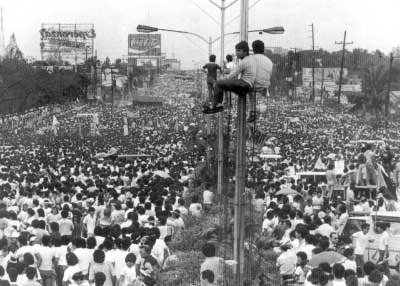
I keep on seeing “unfinished revolution” in media reports about the 28th anniversary of the EDSA People Power Uprising. I find it annoying and offensive for promoting, unwittingly or wittingly, the idea or premise that everyone gave up and no one has bothered to carry the revolution forward.
It sounds as ritualistic and as empty as the EDSA anniversaries sponsored by government, which focus entirely on the date and the form, while conveniently and opportunistically glossing over the substance of the uprising.
Take this year’s EDSA anniversary No. 28. It is about to pass to oblivion and all we read from the media are reports about President BS Aquino marking it in Bohol and Cebu. Nobody asked why. Nobody asked why the deputy presidential spokesperson would call Yolanda victims as the best representation of everything that we fought for at EDSA. They just report the empty statement just like that. And then there are “forums” where pundits bewail an “unfinished revolution”.
EDSA wasn’t about President BS Aquino’s mother, or the cardinal, or the tobacco-chomping general and the defense minister. It wasn’t even about the hundreds of thousands who circled the soldiers fearing for their lives. It was about freedoms lost and regained. It was about the rejection of a dictatorship that plundered our treasury and violated people’s rights. It was about meting a measure of justice by people themselves. It was speaking truth to power. It was achieving the impossible, after a long, arduous struggle where people gave up their lives, families lost their loved ones, and so on.
It is unfortunate that the Aquino son now trivializes the EDSA story by focusing merely on the “salubong”, and taking the celebration away from the capital, where citizens are not as hospitable to his public relations spin. There is no effort in media reportage about the issues that take back the country to pre-1986 conditions: unresolved murders of journalists and activists, massive plunder of public money, enactment of laws that curtail free speech. For instance, there is an apparent failure to connect the Aquino cybercrime law with the loss of freedom, and why 28 years after the downfall of the dictator, free speech is being curtailed and limited, instead of expanded and promoted.
The culprit is that some are terribly afraid to tell and retell the story of our people who who came together, who stood up for many days and nights, who joined elections only to be cheated, and finally, who got fed up and revolted against a dictator who no one thought could be moved or ousted. The story of the capacity of the people to do great things like that. If we could do that to a dictator (and a plunderer several years later), then we could do the same to any government leader who brazenly lies, who uses PR spin to mislead the public, who pretends to be Mr. Clean but enjoys the use of unli-pork barrel, who invented his own pork barrel in the first place, who has no heart for calamity victims, who gives the red carpets to the likes of Napoles but snubs the people of Leyte, and so on.
If there’s another lesson we learned from EDSA in 1986 and in 2001, it is this: Uprisings are important in getting rid of national leaders, but they cannot on their own change the rotten system we all despise and hope to reform. And also: We cannot depend on the goodwill and good intentions of leaders who ultimately would only mold the same system that badly needs to be replaced.
And then there was the poisonous and wrong notion, encouraged by the previous administration that People Power is now passe. Aquino and his ilk rejected that when they were belatedly a part of the anti-Arroyo alliance, but embraced the same false notion when they came to power. It is okay to mobilize and rally in the streets only if Aquino is part of it? What nonsense. How opportunitistic.
For in reality, the unfinished revolution the media is bewailing is being continued by people in their own way, in old and new forms, through causes and movements beyond 1986. They were part of it many times, if we recall.
The faces of this “unfinished revolution” are the same ones fighting the pork barrel and corruption (PDAF and DAP), the ones fighting the Cybercrime Law, the ones demanding land reform especially at Hacienda Luisita, the ones fighting for lower taxes and better services, the ones demanding full support for national athletes, the human rights victims rejecting a police general as head of the claims board, journalists and activists demanding an end to extrajudicial killings, the one demanding transparent, quick and effective relief and rehabilitation for areas devastated by Yolanda, and so on. They are many, they are moving the revolution forward.
The sad thing is that the Aquino whose namesake sacrificed everything at the altar of freedom is the one who now stifles it or blurs and trivializes the struggle for and the cause of freedom altogether.